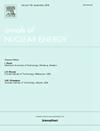Load-tracking performance optimization for a supercritical CO2 recompression cycle under bypass control utilizing variable turbine inlet guide vanes
IF 1.9
3区 工程技术
Q1 NUCLEAR SCIENCE & TECHNOLOGY
引用次数: 0
Abstract
The study evaluates the impact of integrating a turbine equipped with variable inlet guide vanes (VIGVs) on system performance under turbine and heater bypass controls. It discusses effective methods for tuning turbine guide vanes and optimizes the system's load-tracking capabilities. Key results indicate that the turbine bypass mode is more effective than the heater bypass mode, reducing system heat input by increasing the CO2 temperature entering the heater. Optimization shows that the positive and negative rotation of the turbine inlet guide vanes improves thermal efficiency by 6.23% and 6.49% in turbine bypass and heater bypass modes, respectively, at a 10% load ratio. As the load ratio decreases, optimal vane rotation angles increase to enhance load-tracking thermal efficiency, with heater bypass control showing a more significant impact on vane rotation. Additionally, using the VIGVs-fitted turbine eliminates heater bypass flow when load ratios are 80% or higher.
求助全文
约1分钟内获得全文
求助全文
来源期刊

Annals of Nuclear Energy
工程技术-核科学技术
CiteScore
4.30
自引率
21.10%
发文量
632
审稿时长
7.3 months
期刊介绍:
Annals of Nuclear Energy provides an international medium for the communication of original research, ideas and developments in all areas of the field of nuclear energy science and technology. Its scope embraces nuclear fuel reserves, fuel cycles and cost, materials, processing, system and component technology (fission only), design and optimization, direct conversion of nuclear energy sources, environmental control, reactor physics, heat transfer and fluid dynamics, structural analysis, fuel management, future developments, nuclear fuel and safety, nuclear aerosol, neutron physics, computer technology (both software and hardware), risk assessment, radioactive waste disposal and reactor thermal hydraulics. Papers submitted to Annals need to demonstrate a clear link to nuclear power generation/nuclear engineering. Papers which deal with pure nuclear physics, pure health physics, imaging, or attenuation and shielding properties of concretes and various geological materials are not within the scope of the journal. Also, papers that deal with policy or economics are not within the scope of the journal.
 求助内容:
求助内容: 应助结果提醒方式:
应助结果提醒方式:


